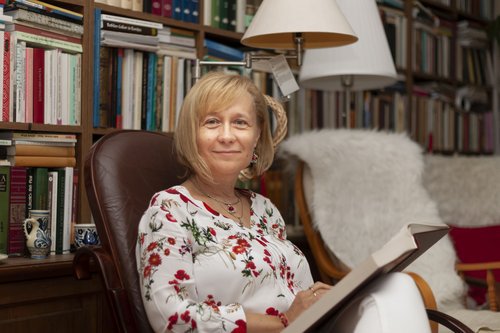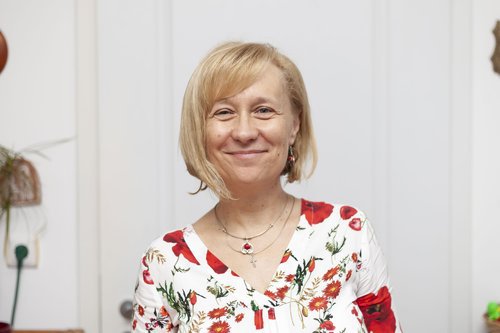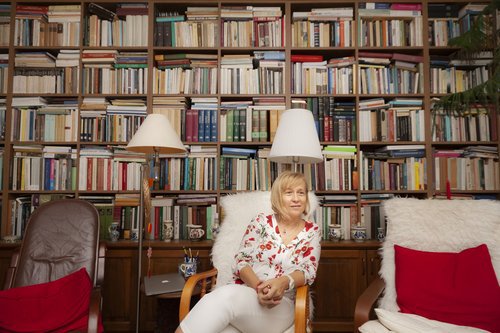We visited church historian Judit Balogh in her home in Miskolc, so that we could speak about the Reformation, and its effects on Hungary. The professor of the Eszterházy Károly University also told us what she personally received from the great Reformers.
Two years ago we have celebrated the five hundredth anniversary of the Reformation. Did we speak about all the details then, or did we overlook something?
The five hundredth anniversary brought us a lot of important events: small and big celebrations, fine publications, self-reflections, collective and individual realizations. At the same time, every jubilee holds the risk that we take some details out of context and slightly over-celebrate things. We may have not highlighted enough that the Reformation is in fact a process, although that’s precisely the point: semper reformanda principle. Actually we should celebrate the special ability of the Reformers to sense that they should interpret the Word of God and His message in a constantly changing world. And after all of these we should be able to live out the piety in our everyday life. The celebrations certainly help in this. At the same time 2017 has illustrated too, that at the levels of the small communities, local congregations we need to protect and pass on with greater awareness our local traditions and strengthen our roots.
How did you celebrate the five hundredth anniversary of the Reformation?
In our congregation for many years we have spent a whole week to celebrate the Reformation. For example we had beers for the memory of Luther, or we tasted food of his time. All of these are great, because they bring closer the taste, the materiality of the process we call Reformation. I think it’s important the things that came to surface during the celebration of 2017 should not disappear, but we should discern, live them out and speak about our past and our relation to it again and again. The church really has payed attention to that the small congregations should try to find their connection the Reformation too. I liked this especially, because earlier I felt that on Reformation Day we regularly have a few lectures about Luther, and about the fact whether he did or did not post the theses on the door of the church, but all of this is really far from us. I’m saying this in spite of the fact that I have also delivered a lot of lectures to small congregations, as well as to big conferences, and I could be part of creating fine educational and academic publications.

Today, after half a millenium plus two years later, what is the message of Reformation to the people in 2019?
I hope that more and more because weare becoming more and more honest, comfortable, and open concerning our own tradition. The meaningless pathos (or big words) cut (or drive away) many people from history, while we may recognize ourselves in the real stories, or we feel, that it could have happened to us too. Moreover there are still a lot of things, that we haven’t told in connection to the Reformation. For example, that the people living their personal relationship with God could form community in a new way. These communities, faithful to the heritage of the Reformation, preserved their congregations in extraordinary ways during the most difficult times too. In the 18th century when the Habsburg Empire tried to silence the Protestants, there were settlements like Jászberény where they rebuilt the church building in almost every two- three years that were torn down by the authorities, and they were still continuously praying and reading the Bible even without having a pastor. These are the wonderful stories of faith and heritage of the Reformation, we don’t really know about. But I think that these are those elements, which we should better build in our memories. Besides new and important stories are currently being written about the People of God, which are all contributing to the heritage that we have received from the Reformation.
Is there a significant difference between the Hungarian and the European Reformation?
Essentially the Hungarian Reformers gained their own „knowledge on the Reformation” in the centres of the European Reformation and the story of their conversion are connected to there. In this sense there is a very close relationship between the events of the Hungarian and the European Reformation. At the same time in the 16th century the Hungarians lived through many traumas, the country around them had fallen apart. Then the famous itinerant preachers were giving hope, and the liturgy and the Bible in Hungarian, all helped healing the wounded national and individual personal identity. The school network, which was created at an unbelievable pace can be called exceptional, or at least unprecedented, and in any case it is a Hungarian specificity. The Hungarian puritans of the 17th century shockingly realized the difference, that the Hungarian church was the only one, which remained with an episcopal, hierarchical structure. An explanation for this can be that a society which couldn’t deal with the traumas was afraid from structural changes. This could play a role for the Hungarian Reformers, that they maybe didn’t want in the beginning, and later in the 17th century they couldn’t get through the changes in the basically hierarchical structure.

Which are the different effects of the Reformation in Hungary?
The first wave of the Reformation swept through everywhere in the country, and the effects were everywhere the same. But there is no doubt, that the Catholic Church and the Habsburg Empire could not be present in the territory of the Ottoman Hungary, as well as in the Principality of Transylvania including the eastern regions. So the Protestantism could be preserved much more in these regions. Transylvania was led by only Reformed rulers in the 17th century, who were trying to support strongly the Churches of the Reformation. This huge initial momentum has broken in the regions of Transdanubia or Upper Hungary. The German-speaking and autonomous royal free cities, like Kassa, Lőcse, Bártfa or Eperjes, have preserved successfully for a long time their own Lutheran identity and institutions, even under Habsburg rule. But the people in villages were more vulnerable against the pressure of rechatolization coming from Vienna, mainly during the 17th century. At this time, namely became more and more baronial family Catholic again because of the activities of Péter Pázmány, the Cardinal Archbishop of Esztergom, and many times they forced their serfs to change their confession, and they also brought Catholic priests to their churches. So the Calvinists and Lutherans had to preserve their faiths in a constant headwind, with a lot of difficulties. This was harder and came with a lot of suffering, but it made these congregations resistant. In Transylvania and in the eastern region Protestant communities have enjoyed the support of their rulers, and the advantages of the school-network. However they became very comfortable with that, so in the 18th century they were more vulnerable against the assaults on their denomination. For example the Reformed nobles of the Székely Land in Transylvania have lost their former leading role against the members of the Catholic Szekely nobles already by the end of the Principality’s era.
The Reformation is still occuring today, or the Church renews only in every five hundred years?
As a church historian I hope that it’s still happening today. The Church can live well with its own heritage, if it continuously renews. It would be an issue if the change only came once every five hundred years because it would mean that the Church is just some museum object which has to be fixed every five hundred years. However, it can be seen that those forms of communication which were the Church’s for a long time, are no longer sufficient. These significant anniversaries are undoubtedly good for facing that. Are we, the Church, capable of being present in society in the way that God would like? If the Church is a medium between the people and God, then here the essential question is communication. The Hungarian Reformed Church started its liturgical reform maybe a bit late. Young people felt for a long time that they weren’t called. Do we have the wisdom to be able to combine the new and the old? I think tradition is important. I remember that in my own university years we were struggling to be able to sing with guitar in the church, and later to find our roots. The new Reformed hymnbook will be published soon, which is a very nice initiative for singing our old songs in a way, so that they will be enjoyable also for those who are listening to it today.

It’s difficult even to count how many studies, essays have you written about the Reformation and Transylvania, or as well as about the Transylvanian Reformation. Why are you so interested in these two topics?
Since I am from a proud, traditional Reformed family on both sides, the Reformed heritage was an essential part of my family’s identity. The love for Transylvania came with the influence of my mother and my high school. Transylvania for me was always a magical region, its history kept me interested since my teenage years. At the university, Principality of Transylvania became my topic. By the end of my foruth year, impacted by my personal experience of conversion, the two connected for me, and I regard it as a great privilege that I am able to research it still to this day.
What are you working on now?
At the moment I’m writing my academic doctoral thesis about the Szekely elite of the Prince Mihály Apafi. It is exciting because Prince Apafi lives in our memory as a great Reformed prince, just as his wife Anna Bornemissza, about whom a youth novel was written. I research social history - the stories of the people. That is how I found a lot of personal documents from the time of Prince Apafi, such as diaries and letters that can give a plastical picture about that period through the eyes of the people from that era. For example a Szekely Reformed Captain called János Nemes, who was taught by the puritan teachers of Marosvásárhely, started and closed every year in his diary with a deep prayer and reacted with shockingly honest words if any grief or joy came to his life. I love seeing how personal stories come together as patterns by which the story of the whole society becomes more understandable.

You have been engaged with the research on the Reformation for thirty years. Did you have any “aha” moment, discovery during this time?
The greatest experience is facing how similar inner conflicts, temptations, delusions characterized the people of the Reformation era to ours. People tend to regard the people who lived five hundred years ago as a bit more “immature” than themselves, that we are more serious and adult than they are. At the same time, we project many times our own notions on them instead of having patience to learn about that era and people. Many times we connect to the past in the same ways as to other people with prejudices and impatience instead of tackling the longer process of learning. It was astonishing for me how few Reformed pastors had Hungarian Bibles in the 16th century. They translated from the Latin Bible, and preached from that too, even after the release of the Bible of Vizsoly. At the same time we would think of the everyday people who were mostly incapable of writing and reading, that they had no biblical knowledge, even though the stories of the Bible filled their everyday life. For example, we know about a peasant woman quoting the Bible in the 16-17th century, or that the women threatened their husbands they’d turn out as Holophernes in the book of Judith. This shows that the people from the early modern period didn’t know today’s version of the Protestant Bible, but the stories of the apocryphal books too.
What does the Reformation personally mean to you?
Personally, it means the overwhelming need for a personal relationship with God, the desire to fill the forms with substance, the freedom to make the frameworks and institutions. The Reformers of the 16th century have feverishly searched the will of God and were not afraid of change if they saw its necessity. I think it’s very beautiful how Luther and his peers gave completely honest answers without compromise to the question everyone was asking in that period, even though very few dared to answer them honestly. From another aspect, I like the Reformation and would like to make it more known to people because despite the Reformers thoughts, there were a lot of things to fix in the Church, they knew with great humility that they were part of a huge story coming from Christ to them. It’s a great experience to learn that we are all part of the story of God. This half sentence, that is said during the Holy Communion “so did our confessor forefathers,” means that to me. It’s good to step in that continuity that didn’t start with the reformers according to my belief, but it could become more vital, clear, and honest through them. I received from the Reformers this kind of honesty and faithfulness exclusively towards God and humility that sees myself as part of a story. This is their great gift for me.
Written by Bence Hegedűs
Originally published in Reformátusok Lapja
Translated by Tímea Tőke
Edited by Avery Gill
Photos by Richárd Kalocsai